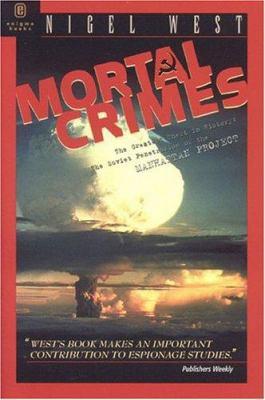
Mortal crimes : the greatest theft in history : the Soviet penetration of the Manhattan Project
Available Copies by Location
| Location | |
|---|---|
| Victoria | Available |
Browse Related Items
- ISBN: 1929631219
- Physical Description xxii, 275 pages : illustrations
- Publisher New York : Enigma Books, [2004]
- Copyright ©2004
Content descriptions
| Bibliography, etc. Note: | Includes bibliographical references (pages 261-264) and index. |
| Immediate Source of Acquisition Note: | LSC 38.00 |
Additional Information

Kirkus Review
Mortal Crimes : The Greatest Theft in History: Soviet Penetration of the Manhattan Project
Kirkus Reviews
Copyright (c) Kirkus Reviews, used with permission.
Ethel Rosenberg was guilty. And so were a lot of other folks working in and around the American effort to build nuclear weaponry. "The sheer scale of hostile penetration of the Manhattan Project, at virtually every level, was quite comprehensive." So writes former British intelligence officer and Conservative MP West (Molehunt, 1989), who knows a good spy story when he sees one. British research into nuclear weaponry had been well penetrated by Soviet operatives early on in WWII, he tells us, thanks to Kim Philby and the like; the Manhattan Project suffered its share of leaks, and not of the radioactive kind, as British scientists who went to work on atomic projects in the US--among them Klaus Fuchs, Donald Maclean, and John Cairncross--delivered information to Soviet intelligence agents. Drawing on transcripts from the federal government's now declassified VENONA investigations, West observes that, surprisingly, Manhattan was compromised early and effectively; the Soviets established a special section in New York in 1943 to handle scientific and technical intelligence, work known only to a handful of Soviet officials outside of the NKVD. Remarked one later KGB officer of the NKVD's efforts: "In the USA we obtained information on how the bomb was made and in Britain of what it was made, so that together they covered the whole problem"--covered it so effectively, in fact, that the Soviets had their bomb much sooner than Western scientists thought possible. There are smoking guns aplenty in West's pages, and they bear the fingerprints of Fuchs, Ted Hall, Steve Nelson, Vivian Glassman, and other figures well known and unknown alike--along with Julius and Ethel Rosenberg, whose martyrs' cloth West rends into tatters. Capably written and well researched, especially considering its large cast of characters. Copyright ©Kirkus Reviews, used with permission.

Library Journal Review
Mortal Crimes : The Greatest Theft in History: Soviet Penetration of the Manhattan Project
Library Journal
(c) Copyright Library Journals LLC, a wholly owned subsidiary of Media Source, Inc. No redistribution permitted.
A blizzard of books has accompanied the opening of the Soviet archives and the declassification of the Soviet espionage activity represented by the publication of the VENONA files. West, who has written extensively on British intelligence and who wrote his own account of VENONA in 1999, offers a detailed chronicle of how the Soviets obtained information to make their atomic bomb. Although the Rosenbergs were executed, and Klaus Fuchs and numerous others were sent to jail, the full extent of Soviet spying was only guessed at until the VENONA files. West laboriously reconstructs the complex espionage network created by Stalin's intelligence service in the United States, beginning in the late 1930s and continuing through World War II. It is a remarkable story, filled with an almost endless cast of shadowy characters using false names and communicating in a cryptic language that has taken years for investigators to decipher (the true identity of some spies will never be known). This is another case of reality being far stranger-and more amazing-than fiction; for most collections.-Ed Goedeken, Iowa State Univ. Lib., Ames (c) Copyright 2010. Library Journals LLC, a wholly owned subsidiary of Media Source, Inc. No redistribution permitted.

Publishers Weekly Review
Mortal Crimes : The Greatest Theft in History: Soviet Penetration of the Manhattan Project
Publishers Weekly
(c) Copyright PWxyz, LLC. All rights reserved
West, a prolific writer on pre- and post-WWII espionage, delivers an in-depth work, this time on Soviet efforts to acquire secrets about the Allies' efforts to develop the atomic bomb. Using recently declassified information from Soviet archives as well as from FBI, CIA and NSA files in the U.S., West assembles pieces of "one of the most significant intricate jigsaw puzzles in history," showing a full story of atomic espionage in America. The cornerstone of his work rests on the Venona files, declassified by the U.S. in the 1990s, which provided a new and entirely authentic list of code names of British and American spies for the Soviet Union. Although West previously wrote about these files in Venona: The Greatest Secret of the Cold War, this new work far from rehashes old information. West puts Venona at the center of a much larger portrait of the key successes and failures of British, American and Canadian espionage units. One of the best sections details not only how the FBI was slow to grasp the scale of Soviet espionage on the West Coast, but also how military authorities were to blame for not sharing secrets, such as not even telling J. Edgar Hoover the purpose of Los Alamos. Overall, West's book makes an important contribution to espionage studies by showing the extent to which Stalin was able to use willing accomplices in the West to provide him with Manhattan Project secrets and help the Soviets develop their own A-bomb. (June) (c) Copyright PWxyz, LLC. All rights reserved


